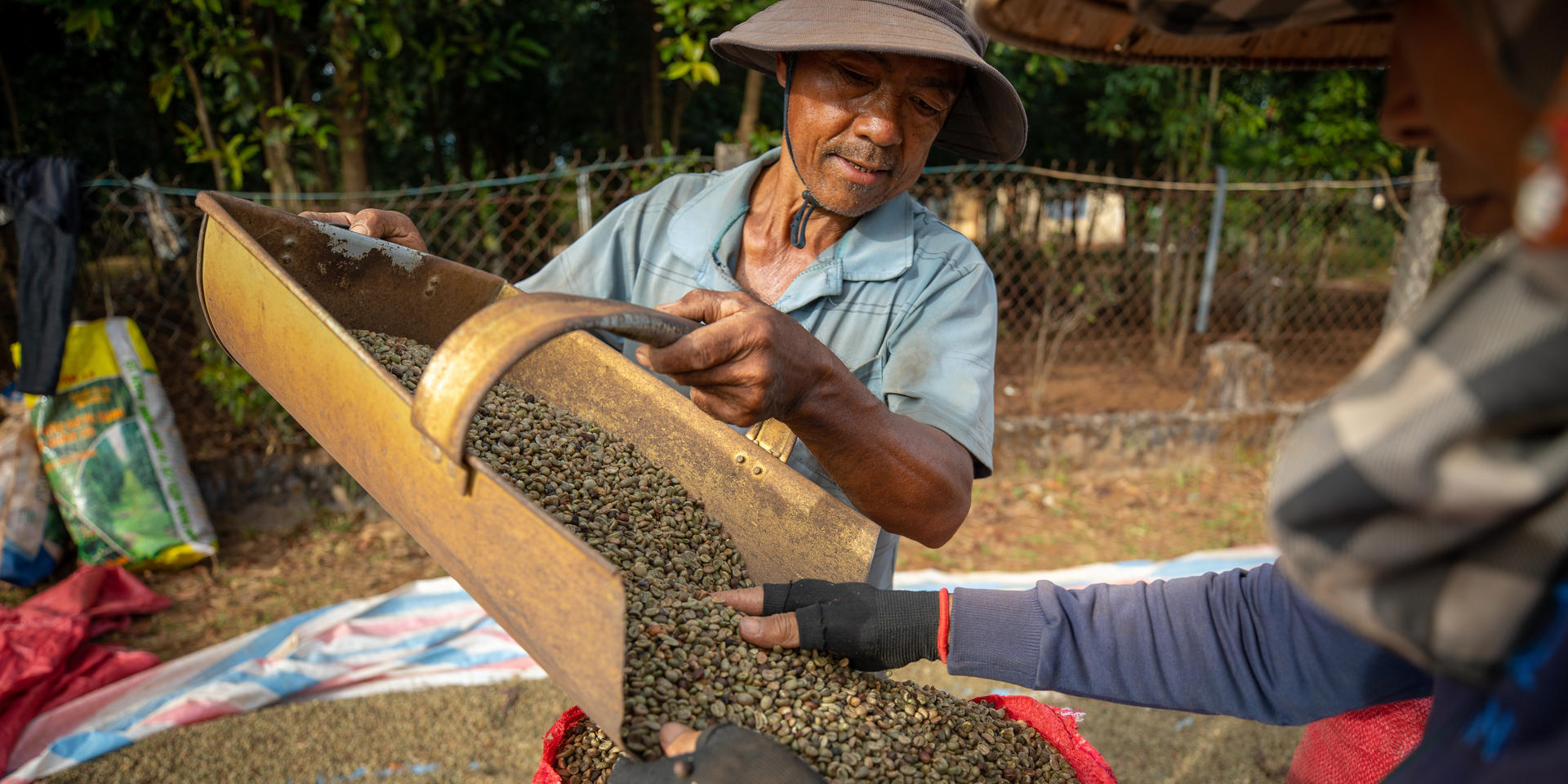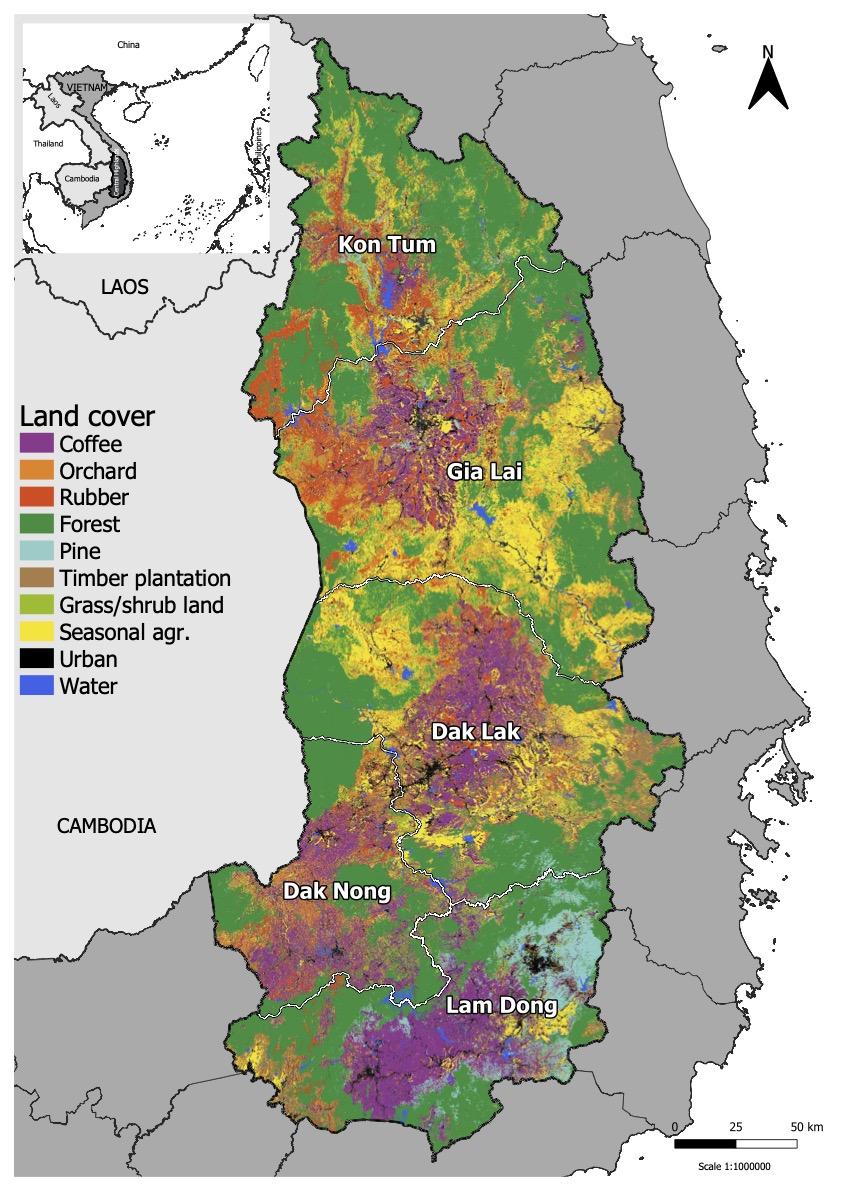Blog Applying AI to coffee farming in Vietnam

Harvesting coffee in the Central Highlands of Vietnam
© 2020 Alliance of Bioversity International and CIAT/Trong Chinh
As most of the world relies on coffee, producers, roasters, and investors are becoming more committed to keep coffee-driven deforestation in Vietnam to a minimum.
Through Artificial Intelligence (AI) and remote sensing, the Alliance and partners are providing information and opportunities to bridge gaps in monitoring forest loss due to coffee production.
The booming coffee industry in Vietnam, the world's second largest coffee producer, influences land-use changes in the country, particularly in the Central Highlands to cater to the steady global demand. These changes, along with the looming impacts of climate change, have been responsible to deforestation and biodiversity loss in this region putting the livelihoods of more than 600,000 smallholder farmers at risk.
Today, the government, private sector, and research organizations are making use of technology and artificial intelligence (AI) in many scenarios and different industries to develop innovative sustainable solutions to some of the challenges farmers and producers face today.
Deforestation and Coffee Farming
It may not occur to many, but coffee farming being a very profitable venture can cause deforestation. With increasing demand for coffee on a global scale, comes the increase in demand for more land and with that, the disappearance of forests. Forests are critical when it comes to fighting climate change, they act as carbon dioxide sinks and keep emissions low. As part of their commitments towards achievement of the United Nations Sustainable Development Goals (SDGs), many countries and big companies in different industries which have an impact on forests have pledged to do their part in combatting deforestation.
Coffee farmers on the other hand have a different view on forests. In their eyes, forests represent very low economic potential when compared to coffee. They therefore cut down trees, pull them out and burn everything to prepare the land for coffee planting. In the past, this was common practice and is one of the reasons coffee farming has been associated with forest loss. To combat climate change, an evolution in farming methods has been encouraged to keep emissions and deforestation low.
Enter the Coffee Vision Project
In Vietnam, the Alliance of Bioversity International and the International Center for Tropical Agriculture (CIAT) is working with SMS Vietnam, the University of Copenhagen’s Department of Geosciences and Natural Resource Management and the Rainforest Alliance on a Nordic Climate Facility-funded project, Coffee Vision, with an aim to address deforestation caused by the expansion of coffee plantations. Using satellite mapping, this project provides a system that combines climate impact suitability maps detecting future areas at risk of deforestation and the unique ability to detect small holder coffee agroforestry systems. In addition, Coffee Vision pulls together relevant actors and stakeholders by more efficiently identifying suppliers who practice good agroforestry practices.
Thanks to the Coffee Vision Project, the School of Business and Engineering Vaud (HEIG-VD), University of Applied Sciences Western Switzerland (HES-SO), and the Alliance of Bioversity International and CIAT are organizing the Artificial Intelligence for Sustainable Agriculture Conference. It will be held on 12 November 2021 with the aim of presenting state-of-the-art technologies and research projects in the domain of AI for sustainable agriculture, as well as serving as a platform for networking.

This land cover map shows the extent of coffee, natural forests and other plantation, agricultural and physical surface coverage of Central Highlands of Vietnam. It is in the highest resolution and highest accuracy of the publicly available land cover maps found in the project team’s review. Hundreds of high-resolution images from ESA Sentinel 1 and 2 satellites, and more than 34,000 GPS locations were collected to calibrate an advanced deep learning model to produce this map. By overlaying this land cover map with historical patterns of deforestation, Coffee Vision will accurately identify coffee grown on deforested lands. The tool will also be able to identify the proximity of protected areas and the presence of shade trees, which are critical aspects of sustainable coffee supply.
What does this mean?
There is a long road ahead to achieve reduction, and eventually stopping coffee-driven deforestation in Vietnam. With a mix of administrative, technological, and consensus building challenges, the project team in the Alliance is striving to bridge these gaps with the help of remote sensing.
In recent assessments, the project team has identified the key gaps in monitoring forest loss due to coffee production:
- Existing deforestation alerts are not relevant to the users and cannot be attributed to their commodity or farm;
- Predicting metrics before trees are lost are scarce and overall scale of areas captured are not targeted;
- Biomass carbon stocks data is not easily accessible and current metrics do not necessarily meet user needs; and
- Access to actionable and understandable data that supports positive action from various stakeholders and actors.
With these in mind, the Coffee Vision project strives to use satellite data and case studies to get next users to become more engaged in sustainable coffee production in the country. By working with the private sector, certification agencies, and producers in needs assessments, the project team hopes that the application for AI and remote sensing can also target improved quality of information of deforestation and related risks and influence the coffee supply chain to prefer deforestation-free coffee to meet their commitments to address deforestation.
This delicate balanced brew ensures a multi-directional approach to combatting deforestation using precision satellite imaging and artificial intelligence application. The project is able to benefit coffee traders, roasters, and investors, and the planet by providing prior intervention in future deforestation risk areas, to maintain sustainability in coffee farming.
More information
For more information about the Artificial Intelligence for Sustainable Agriculture Conference, visit the website here
